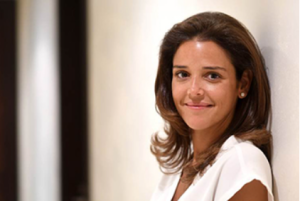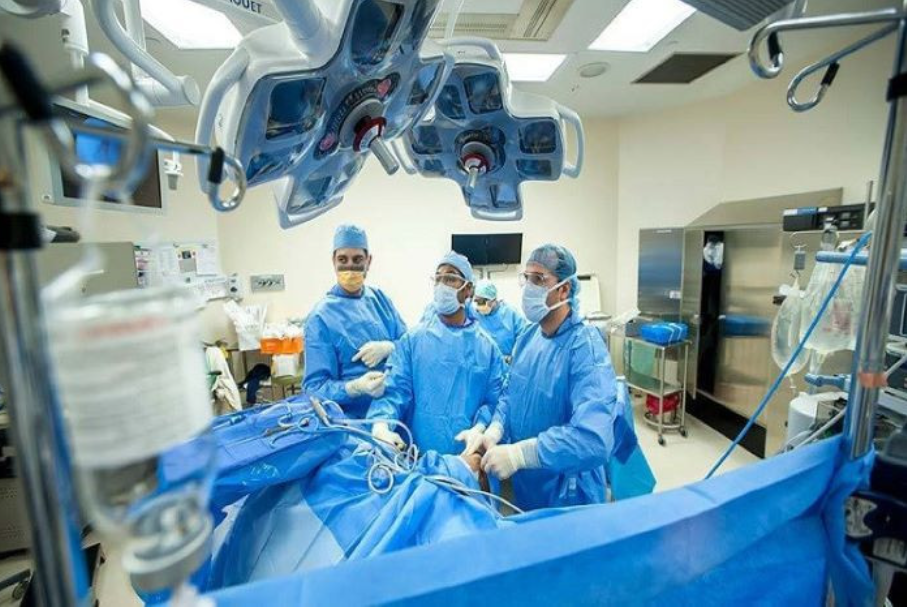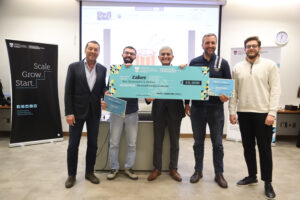Shaping the future of surgical care is not an easy journey, but Proximie, an augmented reality platform that provides a remote surgeons assistance, is paving the way for it.
Consisting of a team of clinicians, engineers and designers throughout Europe, the US and the Middle East, Proximie adopted an augmented reality technology to allow doctors to virtually transport themselves into any clinical setting. The goal is for them to interact with surgeons performing the procedure and guide them in real time, in order to provide a better medical assistance.
One woman is behind all of this: plastic surgeon and cofounder of Proximie, Nadine Hachach-Haram.
In June, the London-based surgeon received the British Empire Medal from the Queen and was listed in the Queen’s birthday honours list for her innovative work in the field of surgery and medicine.
“I am incredibly proud and humbled to receive this award so early in my career. I am passionate about innovation in healthcare, and how we can leverage technology to improve the care our patients receive here in the UK and across the world.” said Nadine in an interview with BDD.

How it all started
Having witnessed through her surgical practice and charity work the increasing demand from patients for healthcare vis-à-vis the outstripping number of doctors available to deliver care, Nadine felt the need to change that.
She started searching for a solution to the problem of shortage of expertise in the surgical field, and how she could use digital communication to provide surgery from afar.
The turning point for her was when she became interested in technology after hearing about new concepts of remote surgery and telemedicine. “Proximie came about when I met Talal Ali Ahmad, an experienced engineer in the United States. Talal added the magical ingredient of augmented reality to my idea and Proximie was born.”
At the end of 2015 and into 2016, Nadine, who is also a lecturer and NHS clinical entrepreneur training program, launched the prototype after conducting several tests. The buzz created around the project by international media outlets like CNN and Reuters at that time brought benefits. Nadine and her founding partner capitalized on this interest and raised money to build a team and a scalable platform.
What doctors, students and staff need to know
Proximie is designed to be easy and engaging to use with no complicated training process required. “When doctors first see Proximie in action they are impressed at how easy it is to use, but also you can see their excitement of how it is able to give them an experience of actually being in the room with their colleague. But prior to that, we engage with all staff, including doctors, nurses, IT departments, education leads and management teams to ensure they are engaged with the technology and that they know how to use it and understand its benefits,” Nadine explained.
Using a basic Internet connection and a webcam from inside the operation room or the emergency room, surgeons can interact via Proximie through Artificial Intelligence (AI) to provide a virtual assistance to colleagues in complex surgeries.
“I oversee the UK team and Talal, who is based in Boston, looks after the US side of the operation. We keep in touch through regular online meetings where we can make decisions and then feedback to our teams. We also have an excellent team in Lebanon, led by our META (Middle East, Turkey and Africa) director Bassem, so between us there is always someone for our people to liaise with,” said Nadine.
The importance of the tool lies in remotely providing doctors in rural hospitals mentoring of new procedures to deliver a safe treatment to their patients, without the need to travel to specialized hospitals. This is achieved with the help of many doctors working with Nadine in more than 10 hospitals around the world.
Today, Proximie goes beyond the operating room as it is also being used by medical device companies and educational institutions.
AI and AR are taking healthcare by storm
While she doubts machine-assisted tools will replace doctors one day, Nadine, a mother of three, is confident that technology will alter the way doctors provide medical care for their patients and give them a better and more efficient experience. This will also help doctors in developing their own skills and knowledge with the extra time on their hands, ultimately for the patient’s benefit.
“Digital technology will definitely become more and more integral to how healthcare services are delivered. AI and augmented reality (AR) are likely to have a significant impact in the years ahead, particularly as they carry the added benefits of high agility, easy deployment and low cost,” she said.
Remarkably, at any given procedure in any given hospital and at any given time, the new technology will increase the availability of doctors and staff working in different locations.
Nadine believes AR plays a critical role in providing a rich, multi-sensory collaborative experience and visualisation of information. “As the technology develops, I expect to see AR software that will link to the results of x-rays, CT or MRI scans to provide ‘live’ internal images of a patient as the surgical team works. AI will also play a role in remote surgery, with practitioners able to request information, data and guidance from the medical equivalent of Alexa or Siri.”
Embracing technology
Nadine’s success journey was certainly paved with few bumps along the way. As a surgeon, the most challenging part for Nadine about developing Proximie was ensuring the use of cutting-edge technology in a simple, practical and powerful way and that going forward was not defined by the technology but by the impact.
A day in Nadine’s life does not fit into a normal routine with her surgical duties and her work at Proximie. “To say that I am busy is an understatement, being organised keeps things on an even keel though and I operate well under pressure. Any spare moment I get in my day is spent with my family, which I really look forward to.” However, she manages to visit Lebanon, her parent’s hometown 6 to 8 times a year.
Bearing in mind the access to high quality healthcare as a fundamental right of every individual, Nadine does not consider emerging technologies like AR and VR (Virtual Reality) as something that is out of reach, stating, “We really can make it happen. Follow your dreams and embrace technology, it is transforming healthcare for the better.”




